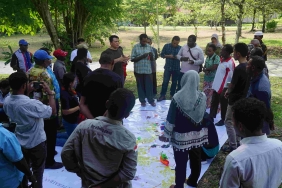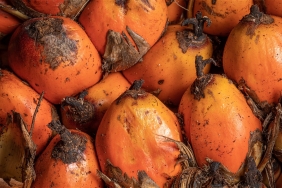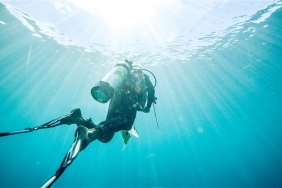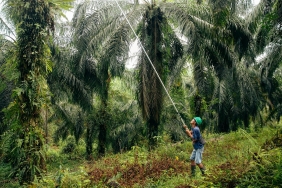KICK OFF OF TERM STRATEGY IN SUO-SUO VILLAGE: SYMBOLIC PLANTING WITH WWF INDONESIA AND STAKEHOLDERS
Concrete steps towards legal, productive, and sustainable land management officially began with the Kick-Off Strategi Jangka Benah (SJB) on May 6, 2025. This activity is a continuation of a series of efforts that have been carried out by WWF-Indonesia together with the Pundi Sumatera Foundation, namely the Benah Term School Workshop at Jambi University with farmers and academics on May 4, 2025 and the CRC Demonstration Plot Visit (Demplot CRC) on May 5, 2025 to provide direct examples to farmers regarding the application of agroforestry in oil palm land. This activity combines participatory approaches, science, and cross-sector policies in solving land management problems in forest areas.
The Kick Off event of the Benah Term Strategy was held in Suo-Suo Village as the pilot project location for the development of the demonstration plot (demonstration plot) of the Benah Term Strategy with a pilot area of 50 hectares. The event was attended by stakeholders from various backgrounds. Present at the event were representatives from the Assistant II of the Tebo District Secretary, Jambi Province Natural Resources Conservation Center (BKSDA), East Tebo Production Forest Management Unit (KPHP), Tebo District Food Security and Fisheries Office, Tebo District Police, Tebo District Koramil, Sumay Sub-District Head, and Suo-Suo Village Head. From academia, representatives from the Faculty of Forestry, Gadjah Mada University (UGM), Faculty of Agriculture, University of Jambi (UNJA), and Faculty of Agriculture, Brawijaya University attended. From the community sector, the Bungo Pandan HTR Cooperative and Setia Jaya Mandiri HTR Cooperative were present as the two main farmer groups that became local partners, as well as assisting institutions such as the Pundi Sumatra Foundation and WWF-Indonesia.
The series of activities began with a speech from Bestamir Arief, Head of the Benah Term Strategy Project from Yayasan Pundi Sumatra. In his speech, he emphasized the importance of cross-sector cooperation in realizing equitable and sustainable forest area governance. That point was also highlighted in a speech by Eka Purnamasari, a representative of WWF-Indonesia, who highlighted the urgency of conservation that is aligned with community welfare. The final remarks came from Joko Ardiawan, SP, Assistant II Secretary of Tebo District, who conveyed the local government's commitment to supporting this initiative as part of the local resource-based regional development agenda.
The next session was filled with scientific presentations from two academics, namely Dr. Forst. Bambang Irawan from UNJA and Dr. Ir. Hero Marhaento, S.Hut., M.Si., IPM, from the Faculty of Forestry UGM. Both explained the basic concepts of the long-term strategy, including the legal framework of social forestry, adaptive agroforestry techniques, and integration schemes of forestry and crops. They also highlighted the importance of land legality as the foundation of farm sustainability, and presented previous research results that showed the potential of combining oil palm with crops such as durian, petai, and meranti in increasing economic value and improving ecosystems.
The activity continued with a symbolic handover of seedlings, as a form of mutual commitment to the sustainability of this project. Participants were then invited to visit the nursery location and the symbolic planting. During the visit, Bestamir Arief explained that the SJB demonstration plot in Suo-Suo Village will be planted with a composition of 40% petai, 30% meranti, and 30% durian - consisting of superior varieties such as musang king, black duri, and bawor. These plants will be planted as inserts between existing oil palm plantations, forming an agroforestry pattern that is adaptive to the conditions of the area.
This kick-off is not the end, but the beginning of a long journey involving active synergy of all parties. The Jangka Benah strategy is not just a technical concept, but also a platform for community organizing, education, and empowerment to fight for land rights legally, productively, and sustainably. Suo-Suo Village is now a pioneer of this transformative movement, with the hope that the implementation and success of this program can benefit and inspire other villages in similar landscapes.




